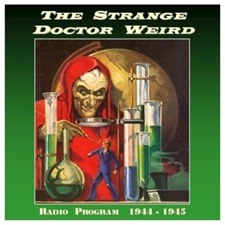
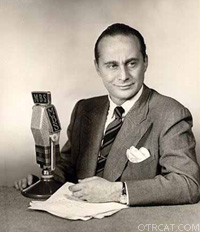 The Strange Dr. Weird (1944-45) aired “The Man Who Knew Everything” on March 20, 1945 as the 20th episode of 28. We have run only eight earlier episodes of this show since 2018, the last two from June of 2023 and January of 2024. The show ran from November of 1944 through May of 1945 in short 15-minute episodes (a few minutes less without commercials), and was dubbed by some as a poor man’s Mysterious Traveler. Indeed, there are similarities between the shows, though MT had a much longer run of nine years (1943-52) and was a full half-hour program. Maurice Tarplin (photo at right, 1911-1975) was the host/narrator for both shows, and one of the writers for MT, Robert A. Arthur (photo lower right, 1909-1969), also penned the scripts for The Strange Dr. Weird. While MT’s shows included tales of mystery and suspense along with SF and the supernatural, The Strange Dr. Weird concentrated mostly on the supernatural. Both shows opened with the narrator setting the stage with a tease for what was to follow, but where MT stories were told in conversation while on a train and ended with the narrator beginning another story only to stop when the unnamed passenger to
The Strange Dr. Weird (1944-45) aired “The Man Who Knew Everything” on March 20, 1945 as the 20th episode of 28. We have run only eight earlier episodes of this show since 2018, the last two from June of 2023 and January of 2024. The show ran from November of 1944 through May of 1945 in short 15-minute episodes (a few minutes less without commercials), and was dubbed by some as a poor man’s Mysterious Traveler. Indeed, there are similarities between the shows, though MT had a much longer run of nine years (1943-52) and was a full half-hour program. Maurice Tarplin (photo at right, 1911-1975) was the host/narrator for both shows, and one of the writers for MT, Robert A. Arthur (photo lower right, 1909-1969), also penned the scripts for The Strange Dr. Weird. While MT’s shows included tales of mystery and suspense along with SF and the supernatural, The Strange Dr. Weird concentrated mostly on the supernatural. Both shows opened with the narrator setting the stage with a tease for what was to follow, but where MT stories were told in conversation while on a train and ended with the narrator beginning another story only to stop when the unnamed passenger to 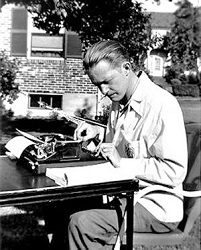 whom the story was being told had to get off, The Strange Dr. Weird ends with a variation on the same gimmick, the narrator beginning a story just as his “guest” has to leave. As you might imagine, with actual story lengths running to around a scant 12 minutes, there’s not much room for characterization or extraneous detail, so only the essentials are conveyed—the idea or dilemma takes center stage and remains front and center. And there is always an unexpected twist at the end, providing the moral comeuppance knife in the heart for the bad guy or evil doer. Short and to the creepy point, there’s no lavish musical score or expensive production values here, only the quintessential organ riffs manipulating and accentuating listener emotion at the proper moments in conjunction with the plights of the actors.
whom the story was being told had to get off, The Strange Dr. Weird ends with a variation on the same gimmick, the narrator beginning a story just as his “guest” has to leave. As you might imagine, with actual story lengths running to around a scant 12 minutes, there’s not much room for characterization or extraneous detail, so only the essentials are conveyed—the idea or dilemma takes center stage and remains front and center. And there is always an unexpected twist at the end, providing the moral comeuppance knife in the heart for the bad guy or evil doer. Short and to the creepy point, there’s no lavish musical score or expensive production values here, only the quintessential organ riffs manipulating and accentuating listener emotion at the proper moments in conjunction with the plights of the actors.
“The Man Who Knew Everything” is one of those curious stories that begs the listener to guess which direction the tale will take. Is the man’s knowledge based on his genetics and somehow accumulates over time due to his day to day experiences and time on Earth? Is the configuration of his brain such that it will hold an almost infinite amount of knowledge? Is it perhaps chemically induced? If so, how often does he need a chemical refresher to maintain his vast store of knowledge? Does he know everything in a different sense because he can perhaps read minds and steal the information he acquires from anyone he reads? Depending on the answer one must also ask what would others do, to what lengths would they go, to acquire this world shattering ability if possible? And how would they use it–for the good of mankind or for personal, selfish, or even criminal reasons? At only twelve minutes and nine seconds I am reluctant to tease with specifics, but will say only that after you listen to this short radio drama you will understand why I am utterly compelled to dedicate it to Alec Baldwin.
Play Time: 12:09
{“The Man Who Knew Everything” aired on a Tuesday evening in late March of 1945. The boring part of the school week lay ahead of the neighborhood gang, so to fight the upcoming ennui of the rest of the week they headed forthwith to the nearby newsstand after school to keep the boredom at bay with some of their favorite detective and science fiction magazines, where boredom was a land never visited within the pulp pages of these fine magazines. Crack Detective (1938-57) while it had a formidable run of 20 years and must have been doing something right, was eventually remembered more for its multiple name changes (eight) over its existence than anything else. It was a bi-monthly in 1945. Detective Tales (1935-53) was a respectable addition to the pulp detective ranks, attracting many of the contemporary favorite and trustworthy practitioners of the genre with stories interesting enough to keep readers guessing and turning pages. It sold well enough to rack up no fewer than 202 issues. It was a monthly in 1945. Thrilling Wonder Stories (1936-55) was one of the favorite of the old-style SF pulps, in that it featured colorful action adventures on different worlds and paid scant attention to scientific accuracy or plausibility, opting for plot-driven exploits with clear cut good guys and bad guys (or aliens or monsters) and more often than not including a female heroine in need of saving from said bad guys, aliens, or monsters. In short, it was a ton of fun for its young, mostly male readership, and formed one third of the loose triumvirate of like-minded SF pulps along with Planet Stories and Startling Stories, pulps much beloved and never forgotten by many older SF fans who grew up absorbing the imaginative tales into their very pores. Many of their stories have been reprinted in any number of collections over the years, and the original issues, where they can be found in SF convention dealer rooms, are known to sell for a pretty penny depending on several factors. It was a quarterly in 1945.}
[Left: Crack Detective, 3/45 – Center: Detective Tales, 3/45 – Right: Thrilling Wonder Stories, Spring/45]
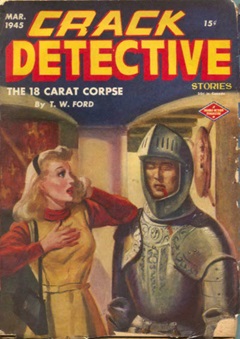
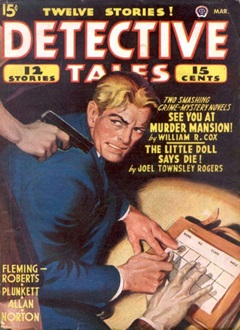
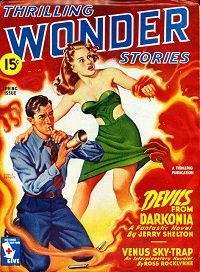
To view the entire list of weekly Old Time Radio episodes at Tangent Online, click here.